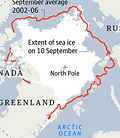European scientists say the extent of Arctic sea ice melt this summer reached a level not observed since satellite tracking began in 1972 and is probably at its lowest level in at least 8,000 years. In an analysis of satellite data, researchers at the University of Bremen in Germany calculated that sea ice covered an area of about 4.24 million square kilometers on Sept. 8. The previous summer minimum occurred in September 2007, when ice covered about 4.27 million square kilometers. While Arctic sea ice melts and refreezes annually, the rate of melt is now twice as great as in 1972, according to the U.S. National Snow and Ice Data Center (NSIDC). The NSIDC is expected to release its own data on sea ice extent in the next week. A University of Washington study released last week showed Arctic sea-ice volume has reached its lowest level in recorded history. According to the study, the volume of sea ice last month was about 2,135 cubic miles, roughly half the average volume in 1979. If current trends continue, scientists say the Arctic could be largely ice-free during the summer within three decades.
Record-low Sea Ice Extent Was Reached in Arctic Ocean This Summer
More From E360
-
OPINION
Forest Service Plan Threatens the Heart of an Alaskan Wilderness
-
INTERVIEW
Pakistan’s Solar Revolution Is Bringing Power to the People
-
Food & Agriculture
In Uganda, Deadly Landslides Force an Agricultural Reckoning
-
Energy
Why U.S. Geothermal May Advance, Despite Political Headwinds
-
Food & Agriculture
In War Zones, a Race to Save Key Seeds Needed to Feed the World
-
Climate
Lightning Strikes the Arctic: What Will It Mean for the Far North?
-
RIVERS
A Win for Farmers and Tribes Brings New Hope to the Klamath
-
Solutions
Deconstructing Buildings: The Quest for New Life for Old Wood
-
NATURAL DEFENSES
How Restored Wetlands Can Protect Europe from Russian Invasion
-
Solutions
Birds vs. Wind Turbines: New Research Aims to Prevent Deaths
-
Biodiversity
Cambodian Forest Defenders at Risk for Exposing Illegal Logging
-
OPINION
The ‘Green’ Aviation Fuel That Would Increase Carbon Emissions
